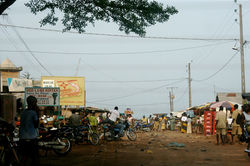Benin
Benin
Benin (/bɛˈniːn, bɪ-/ beh-NEEN, bih-; French: Bénin [benɛ̃]), officially the Republic of Benin (French: République du Bénin) and formerly Dahomey, is a country in West Africa. It is bordered by Togo to the west, Nigeria to the east, and Burkina Faso and Niger to the north. The majority of its population lives on the small southern coastline of the Bight of Benin, part of the Gulf of Guinea in the northernmost tropical portion of the Atlantic Ocean.[8] The capital of Benin is Porto-Novo, but the seat of government is in Cotonou, the country's largest city and economic capital. Benin covers an area of 114,763 square kilometres (44,310 sq mi) and its population in 2016 was estimated to be approximately 10.87 million. Benin is a tropical nation, highly dependent on agriculture, with substantial employment and income arising from subsistence farming.
Official language of Benin is French. However, indigenous languages such as Fon and Yoruba are commonly spoken. The largest religious group in Benin is Roman Catholicism, followed closely by Islam, Vodun and Protestantism. Benin is a member of the United Nations, the African Union, the Organisation of Islamic Cooperation, the South Atlantic Peace and Cooperation Zone, La Francophonie, the Community of Sahel-Saharan States, the African Petroleum Producers Association and the Niger Basin Authority.
From the 17th to the 19th century, the main political entities in the area were the Kingdom of Dahomey, along with the city-state of Porto-Novo, and a large area with many different tribes to the north. This region was referred to as the Slave Coast from as early as the 17th century due to the large number of slaves shipped to the New World during the Trans-Atlantic slave trade. After slavery was abolished, France took over the country and renamed it French Dahomey. In 1960, Dahomey gained full independence from France. It has had a tumultuous history since then, with many different democratic governments, military coups, and military governments.
A Marxist–Leninist state called the People's Republic of Benin existed between 1975 and 1990. In 1991, it was replaced by the current multi-party Republic of Benin.
Etymology
During the colonial period and at independence, the country was known as Dahomey. On 30 November 1975, it was renamed to Benin, after the body of water on which the country lies—the Bight of Benin. This had been named by Europeans after the Benin Empire in (present-day Nigeria). The country of Benin has no connection to Benin City in modern Nigeria, nor to the Benin bronzes. The form "Benin" is the result of a Portuguese corruption of the city of Ubinu (now Benin City).
The new name, Benin, was chosen for its neutrality. Dahomey was the name of the former Fon Kingdom of Dahomey, which was limited to most of the southern third of the present country and therefore did not represent Porto-Novo (a rival Yoruba state in the south), central Benin (which is also dominated by the Yoruba), the multi-ethnic northwestern sector Atakora, nor the Bariba Kingdom of Borgu, which covered the northeastern district.
 |  |  |
|---|---|---|
 |  |  |
 |  |
Source :Wikipedia



